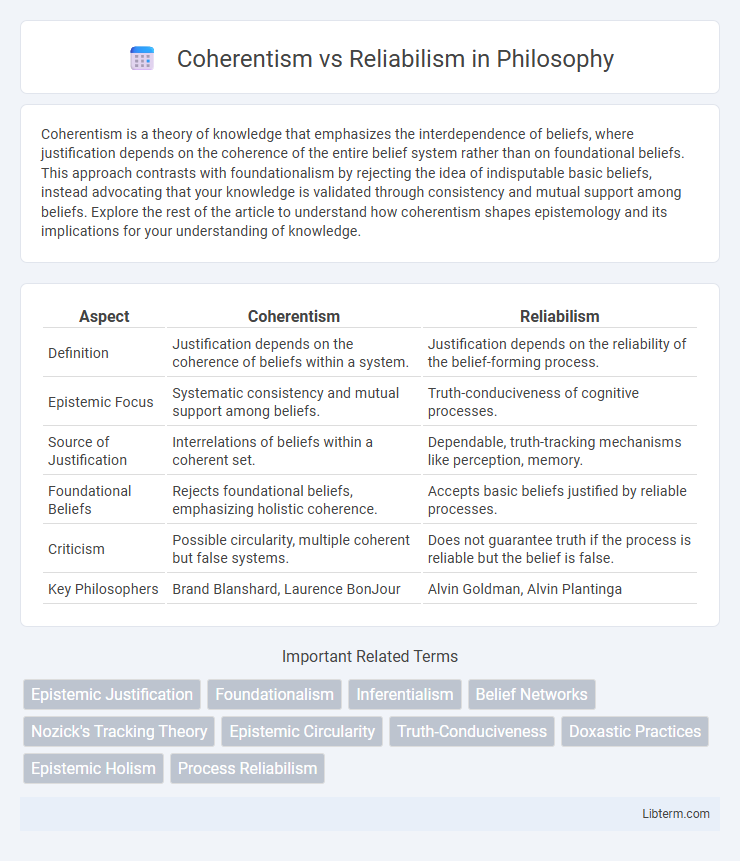Coherentism is a theory of knowledge that emphasizes the interdependence of beliefs, where justification depends on the coherence of the entire belief system rather than on foundational beliefs. This approach contrasts with foundationalism by rejecting the idea of indisputable basic beliefs, instead advocating that your knowledge is validated through consistency and mutual support among beliefs. Explore the rest of the article to understand how coherentism shapes epistemology and its implications for your understanding of knowledge.
Table of Comparison
| Aspect | Coherentism | Reliabilism |
|---|---|---|
| Definition | Justification depends on the coherence of beliefs within a system. | Justification depends on the reliability of the belief-forming process. |
| Epistemic Focus | Systematic consistency and mutual support among beliefs. | Truth-conduciveness of cognitive processes. |
| Source of Justification | Interrelations of beliefs within a coherent set. | Dependable, truth-tracking mechanisms like perception, memory. |
| Foundational Beliefs | Rejects foundational beliefs, emphasizing holistic coherence. | Accepts basic beliefs justified by reliable processes. |
| Criticism | Possible circularity, multiple coherent but false systems. | Does not guarantee truth if the process is reliable but the belief is false. |
| Key Philosophers | Brand Blanshard, Laurence BonJour | Alvin Goldman, Alvin Plantinga |
Introduction to Epistemic Justification
Coherentism and reliabilism offer distinct approaches to epistemic justification within the theory of knowledge. Coherentism asserts that beliefs are justified when they cohere with an interconnected system of beliefs, emphasizing internal consistency and mutual support. Reliabilism, contrastingly, grounds justification in the reliability of cognitive processes, asserting that beliefs formed through dependable methods are epistemically justified regardless of their coherence with other beliefs.
Defining Coherentism
Coherentism defines justification as the extent to which beliefs logically cohere within a comprehensive system, emphasizing mutual support among beliefs rather than reliance on foundational truths. This epistemological theory contrasts with Reliabilism, which grounds justification in the reliability of the cognitive processes that produce beliefs. The strength of Coherentism lies in its holistic approach, assessing justification through the consistency and interconnectedness of the entire belief network.
Key Principles of Reliabilism
Reliabilism asserts that a belief is justified if it is produced by a reliable cognitive process, emphasizing truth-conduciveness as the key measure of justification. This theory contrasts with coherentism by prioritizing the external success of belief formation rather than internal consistency among beliefs. Central to reliabilism is the focus on empirical reliability, linking justification directly to the dependability of perceptual, memory, and inferential mechanisms in generating true beliefs.
Historical Development of Both Theories
Coherentism emerged in the early 20th century, influenced by philosophers like Brand Blanshard who emphasized the interconnectedness of beliefs forming a coherent system as justification for knowledge. Reliabilism developed mid-20th century, with Alvin Goldman advocating that knowledge relies on reliable cognitive processes producing true beliefs, shifting focus to the reliability of belief-forming mechanisms. These contrasting theories illustrate the evolving epistemological debate between internal coherence and external reliability as foundations for justified belief.
Core Differences Between Coherentism and Reliabilism
Coherentism asserts that beliefs are justified based on their coherence with a system of interconnected beliefs, emphasizing internal consistency and mutual support. Reliabilism bases justification on the reliability of the cognitive process that produces the belief, focusing on external factors such as the truth-conduciveness of the method. The core difference lies in coherentism's dependence on the holistic structure of belief systems, while reliabilism prioritizes the objective reliability of the belief-forming process regardless of coherence.
Strengths of the Coherentist Approach
The coherentist approach in epistemology excels by emphasizing the interconnectedness of beliefs, ensuring consistency across the belief system which enhances justification strength. It allows for flexible integration of new evidence, enabling a dynamic and holistic understanding rather than relying solely on isolated sensory inputs. This method effectively addresses complex knowledge scenarios by prioritizing the mutual support among beliefs, fostering a robust framework for truth validation.
Strengths of the Reliabilist Approach
Reliabilism excels in providing an objective framework for epistemic justification by emphasizing the reliability of cognitive processes that produce true beliefs. This approach effectively accounts for knowledge acquisition in ordinary and scientific contexts by grounding justification in the success rates of belief-forming mechanisms. Its strength lies in connecting epistemic justification to empirical evidence and avoiding the regress problem inherent in other theories like coherentism.
Criticisms and Challenges Facing Coherentism
Coherentism faces criticism for its potential circularity, as it relies on the coherence of a belief system rather than an external justification, making it vulnerable to the problem of isolated coherent but false belief sets. It also struggles with the issue of the "isolation objection," where a coherent set of beliefs may be disconnected from empirical reality, undermining its epistemic reliability. Critics argue that coherentism lacks a clear mechanism for incorporating new, independent evidence without disrupting the entire belief system's coherence.
Criticisms and Challenges Facing Reliabilism
Reliabilism faces significant criticisms centered on its reliance on the external reliability of cognitive processes, which can lead to the problem of epistemic luck and the challenge of defining what constitutes a "reliable" method across diverse contexts. Critics argue that reliabilism struggles with the internal accessibility of justification, making it difficult for subjects to know or justify why their beliefs are reliable. Unlike coherentism, which emphasizes the internal coherence of belief systems, reliabilism's externalist approach faces ongoing debates about the epistemic value of processes in varied and complex environments.
Contemporary Perspectives and Future Directions
Contemporary perspectives on coherentism emphasize the integration of belief systems as mutually supportive networks, highlighting its strength in addressing epistemic justification through holistic coherence metrics, whereas reliabilism centers on the trustworthiness of cognitive processes and the probability of producing true beliefs. Emerging research explores hybrid models that aim to reconcile internalist concerns with externalist reliability, fostering more comprehensive epistemic frameworks adaptable to artificial intelligence and epistemic pluralism. Future directions suggest expanding reliabilist criteria to include contextual and social factors while refining coherence measures through computational methods, advancing the epistemology of knowledge acquisition in complex and dynamic environments.
Coherentism Infographic

 libterm.com
libterm.com